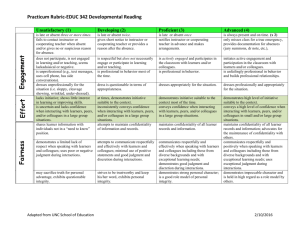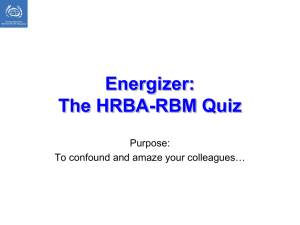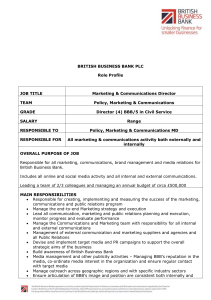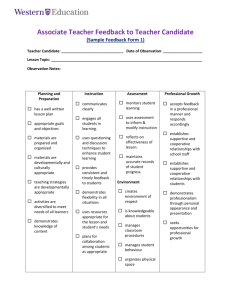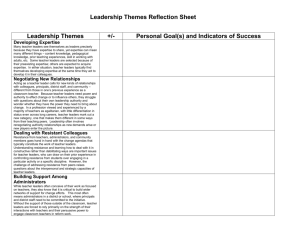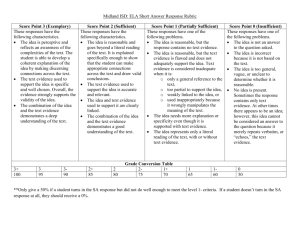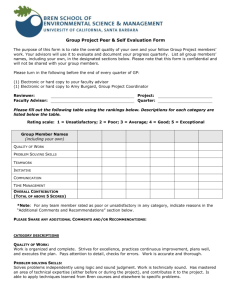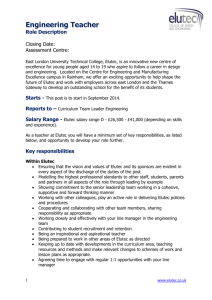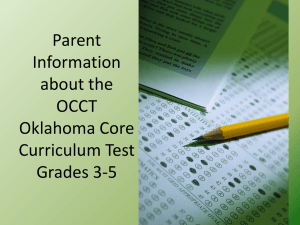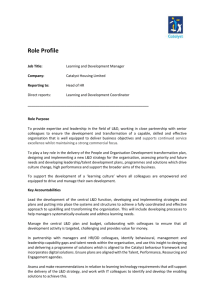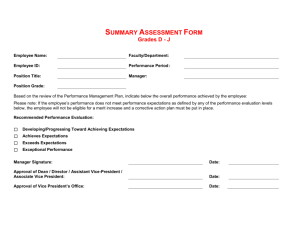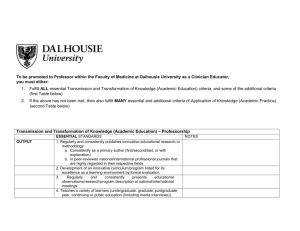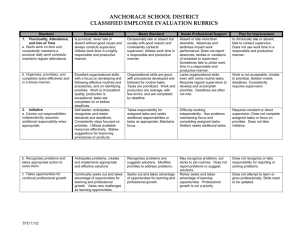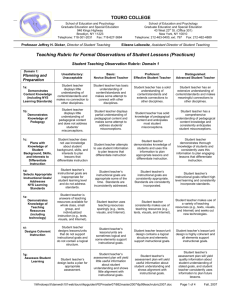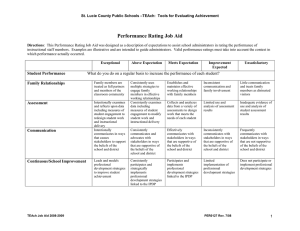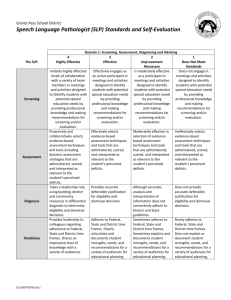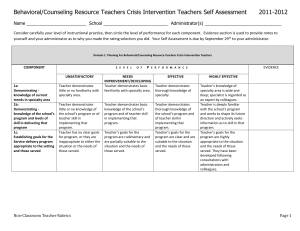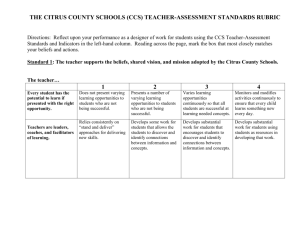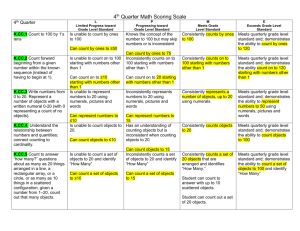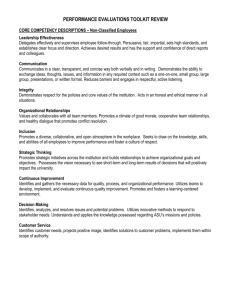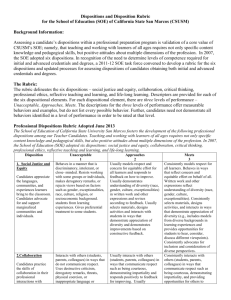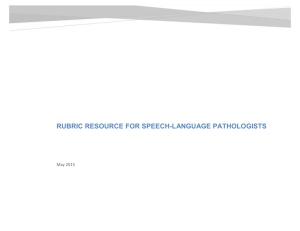Elementary & Early Childhood Observation Form
advertisement
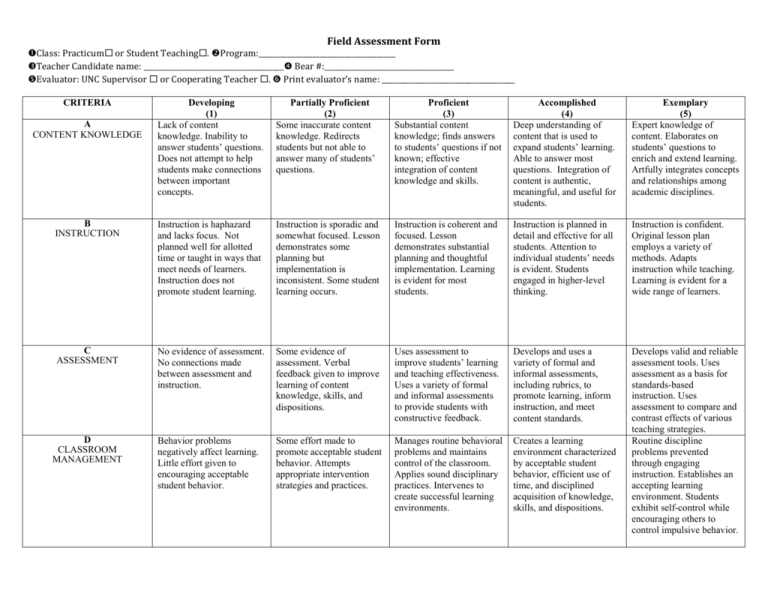
Field Assessment Form Class: Practicum or Student Teaching. Program:______________________________________ Teacher Candidate name: _______________________________________ Bear #:____________________________________ Evaluator: UNC Supervisor or Cooperating Teacher . Print evaluator’s name: _____________________________________ CRITERIA Developing (1) Lack of content knowledge. Inability to answer students’ questions. Does not attempt to help students make connections between important concepts. Partially Proficient (2) Some inaccurate content knowledge. Redirects students but not able to answer many of students’ questions. Proficient (3) Substantial content knowledge; finds answers to students’ questions if not known; effective integration of content knowledge and skills. Accomplished (4) Deep understanding of content that is used to expand students’ learning. Able to answer most questions. Integration of content is authentic, meaningful, and useful for students. Exemplary (5) Expert knowledge of content. Elaborates on students’ questions to enrich and extend learning. Artfully integrates concepts and relationships among academic disciplines. B INSTRUCTION Instruction is haphazard and lacks focus. Not planned well for allotted time or taught in ways that meet needs of learners. Instruction does not promote student learning. Instruction is sporadic and somewhat focused. Lesson demonstrates some planning but implementation is inconsistent. Some student learning occurs. Instruction is coherent and focused. Lesson demonstrates substantial planning and thoughtful implementation. Learning is evident for most students. Instruction is planned in detail and effective for all students. Attention to individual students’ needs is evident. Students engaged in higher-level thinking. Instruction is confident. Original lesson plan employs a variety of methods. Adapts instruction while teaching. Learning is evident for a wide range of learners. C ASSESSMENT No evidence of assessment. No connections made between assessment and instruction. Some evidence of assessment. Verbal feedback given to improve learning of content knowledge, skills, and dispositions. Uses assessment to improve students’ learning and teaching effectiveness. Uses a variety of formal and informal assessments to provide students with constructive feedback. Develops and uses a variety of formal and informal assessments, including rubrics, to promote learning, inform instruction, and meet content standards. D CLASSROOM MANAGEMENT Behavior problems negatively affect learning. Little effort given to encouraging acceptable student behavior. Some effort made to promote acceptable student behavior. Attempts appropriate intervention strategies and practices. Manages routine behavioral problems and maintains control of the classroom. Applies sound disciplinary practices. Intervenes to create successful learning environments. Creates a learning environment characterized by acceptable student behavior, efficient use of time, and disciplined acquisition of knowledge, skills, and dispositions. Develops valid and reliable assessment tools. Uses assessment as a basis for standards-based instruction. Uses assessment to compare and contrast effects of various teaching strategies. Routine discipline problems prevented through engaging instruction. Establishes an accepting learning environment. Students exhibit self-control while encouraging others to control impulsive behavior. A CONTENT KNOWLEDGE E AFFECTIVE SKILLS Has difficulties relating to students. Resorts to disrespectful treatment. Displays inappropriate behavior towards students. Does not attempt to build positive teacher/student relationships. Appears to be unsure of proper teacher boundaries. Behavior not always appropriate; inappropriate behavior not intentional or malicious. Lacks ability to anticipate consequences of behavior. Works diligently to create a democratic classroom community. Students are treated with kindness and respect. Establishes a democratic learning environment. Encourages students to care about their own learning, is sensitive to students’ needs and feelings. F PROFESSIONALISM (cooperating teacher only) Cannot be consistently counted upon to meet deadlines or keep professional commitments to colleagues and students. Inconsistently conveys confidence and competence when interacting with learners, peers, and/or colleagues in a large group situation. Reliable, punctual, and collaborative. Conveys a high level of confidence and competence when interacting with learners, peers, and colleagues in small and large group situations. Avoids professional collaboration and/or detracts from a collaborative culture; gossips about colleagues; and/or tends to be openly critical of others. Generally demonstrates initiative and enthusiasm for various endeavors. Unsure of how to act appropriately with students, peers, and/or colleagues. Does minimum required work at the prompting of supervisors; lacks initiative; resists suggestions for improving one’s teaching. Respects school culture, norms and values. Works with others in positive ways; contributes to group success; minimizes gossip; generally willing to grow. Asks questions that are both procedural and reflective; accepts critique and input regarding performance in a generally positive manner; generally acts upon feedback when prompted. Consistently meets deadlines, keeps professional commitments to colleagues and students. COMMENTS: Attach another sheet to discuss student Strengths and Areas in Need of Improvement. Evaluator Signature: Date: Teacher Candidate Signature: Date: Demonstrates initiative; is enthusiastic about a variety of endeavors. Strong group participant; works well with others while receiving feedback; follows up on opportunities for professional growth. Respects diversity of colleagues and students and models culturally responsive interactions with others. Establishes a democratic learning environment. Students care about other’s learning as well as their own. Individuals willing to make personal sacrifices for sake of promoting a common good. Consistently demonstrates tactfulness and/or confidentiality; maintains professional boundaries. Consistently reliable, punctual, hard-working, willing and able to collaborate. Consciously learns and supports school’s norms and traditions. Consistently demonstrates tactfulness and/or confidentiality; maintains professional boundaries Self-evaluates in a realistic way; makes thoughtful changes based upon reflection; views teaching as a learning process.
